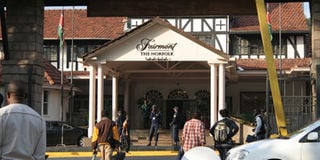20 killed in bomb attack on Norfolk

The Norfolk Hotel, Nairobi as it looks today. A bomb that exploded at the hotel's dining room on December 31, 1980 killed 20 people and wounded more than 80 others. The bombing was blamed on the Palestinian Liberation Organisation (PLO) but it denied responsibility. PHOTO|FILE.
What you need to know:
- The bomb had killed 20 people and wounded more than 80.
- Both Palestinian splinter groups had a bone to pick with Kenya for its role in the successful Entebbe raid of 1976.
- These two events placed Kenya in the crosshairs of all of Israel’s enemies, including the numerous splinter guerrilla organisations such as the PLO and PFLP.
Diners had assembled at the Norfolk for a New Year’s Eve dinner when the room directly above the dining room exploded shortly before midnight.
By dawn, 25 per cent of the 68-year-old Nairobi landmark lay in debris and carnage.
The bomb had killed 20 people and wounded more than 80.
The Norfolk bombing was blamed on the Palestinian Liberation Organisation (PLO) but it denied responsibility.
Suspicion then shifted to its rival, the Popular Front for the Liberation of Palestine (PFLP).
Both Palestinian splinter groups had a bone to pick with Kenya for its role in the successful Entebbe raid of 1976.
Although the PFLP had carried out the hijacking, the PLO and other organisations were opposed to any country seen as cosying up to the Jewish state.
Owned by Block Hotels
At the time, a local Jewish firm known as Block Hotels owned and operated the Norfolk Hotel.
It was not entirely implausible that the hotel was targeted for its Jewish connections.
Bomb experts concluded that it had been a sophisticated time bomb.
Within a few hours, the Kenyan police released the name of the suspect, Qaddura Mohammed Abdel al-Hamid, a 34-year-old Moroccan man travelling on a Maltese passport.
Qadurra had booked the room directly above the bar for the last week of 1980 but slipped out on the afternoon of December 31.
He was already on his way to Saudi Arabia by the time the bomb exploded. Almost nothing else was known about him except that he was a member of the PFLP.
The guerrilla organisation, however, disowned him.
No connection
In its statement published in Lebanese newspapers, the PFLP said: ‘‘The Front has absolutely no connection regarding the allegations of the Kenyan Government.
The front has enough courage to declare its responsibility when it undertakes any such operation.’’
Two events in 1976 had most likely set the stage for the bombing: The arrest of terrorists at Kenya’s airport, then called the Nairobi Airport, and the raid on Entebbe.
Three Palestinians and two West Germans had attempted to blow up an El Al airliner at the Nairobi Airport in 1976.
Kenya apprehended the five terrorists and deported them to Israel.
The West Germans had been released a few months prior to the 1980 bombing but they vehemently denied any involvement in the Norfolk bombing.
In 1976, Palestinian and West German terrorists also hijacked an Air France plane carrying 258 passengers.
They flew the plane to Entebbe in Uganda, then ruled by Idi Amin.
The hijackers released all non-Israeli passengers but the crew, which was composed of non-Israelis, elected to stay behind.
The PFLP hijackers then released their demands and threatened to kill all the hostages.
Daring rescue
As the crisis progressed, Israel devised a daring rescue.
Yonatan (Yoni) Netanyahu, the elder brother of the current prime minister of Israel, Benjamin (Bibi) Netanyahu, led the commando unit tasked with executing the rescue.
He was the only military casualty on the Israeli side after a Ugandan sniper shot him.
Two Israeli hostages also died during the firefight. Twenty Ugandan soldiers and all seven hijackers were killed.
In retaliation, Amin’s men killed a 74-year-old woman, Dora Bloch, who had been left behind because she had been moved to a hospital for treatment.
The commandos destroyed nearly all the Ugandan Airforce Mig-17 fighters and then flew to the Nairobi Airport to refuel.
The refuelling had been organised by Ehud Barak, another Israeli fighter who later rose to the premier’s position.
These two events placed Kenya in the crosshairs of all of Israel’s enemies, including the numerous splinter guerrilla organisations such as the PLO and PFLP.
They also strained East African relations, already tense due to the collapse of the East African Community.
Amin considered Kenya’s role in the rescue a slight and retaliated by ordering the killing of Kenyans living in Uganda.




